
Algorithms for Molecular Biology
metrics 2024
Connecting minds to advance the science of life.
Introduction
Algorithms for Molecular Biology, published by BMC, is a premier Open Access journal dedicated to advancing the field of molecular biology through innovative computational methods. Since its inception in 2006, the journal has provided a vital platform for researchers to share their findings and methodologies, covering a diverse range of topics at the intersection of applied mathematics, computational theory, and molecular biology. With a notable impact factor reflected in its Scopus ranks, including a Q2 classification in both applied mathematics and computational theory, as well as Q3 in molecular and structural biology, the journal plays an essential role in this rapidly evolving discipline. The wide accessibility of articles published under the Open Access model ensures that research findings reach a global audience, fostering collaboration and innovation amongst scientists and professionals alike. As we look towards converging years from 2006 to 2024, Algorithms for Molecular Biology continues to uphold the highest standards of scientific integrity and excellence, reinforcing its status as a key resource for those engaged in the profound complexities of molecular biology.
Metrics 2024
 -
- 1.50
1.50 1.30
1.30 -
-Metrics History
Rank 2024
IF (Web Of Science)
JCI (Web Of Science)
Quartile History
Similar Journals
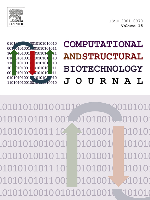
Computational and Structural Biotechnology Journal
Advancing the Frontiers of Biotechnology through Computational InsightComputational and Structural Biotechnology Journal is a premier open-access journal published by Elsevier, focusing on the intersection of computer science and molecular biology. Since its inception in 2012, the journal has established itself as a leading platform for innovative research, featuring groundbreaking studies in biochemistry, biophysics, biotechnology, and genetics. With a remarkable Q1 ranking in multiple categories, including Biochemistry and Genetics, it stands out for its high impact, evidenced by its strong Scopus ranking percentile scores. As a vital resource for researchers, professionals, and students, the journal aims to foster the dissemination of essential findings that leverage computational techniques to explore complex biological systems. In a rapidly evolving scientific landscape, Computational and Structural Biotechnology Journal serves as an indispensable resource for those looking to contribute and stay abreast of major advancements in the field.
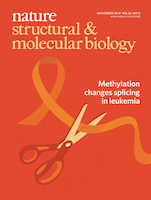
NATURE STRUCTURAL & MOLECULAR BIOLOGY
Leading the Charge in High-Impact Biological StudiesNATURE STRUCTURAL & MOLECULAR BIOLOGY is a leading journal published by NATURE PORTFOLIO, dedicated to advancing the field of molecular and structural biology since its inception in 1998. With an impressive impact factor that places it in the Q1 quartile across both the Molecular Biology and Structural Biology categories, this journal is pivotal for researchers and professionals seeking to publish innovative and high-impact results. Its Scopus ranking further highlights its elite status, with a remarkable 98th percentile for Structural Biology and 95th for Molecular Biology. While the journal does not currently offer open access, it continues to foster a rich discourse among scientists by providing a platform for the dissemination of groundbreaking research. Located in the United Kingdom and operated from Berlin, the journal's commitment to excellence positions it as an indispensable resource for students, researchers, and practitioners in the realms of biochemistry, genetics, and molecular biology.
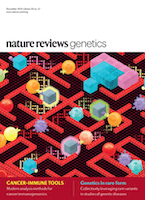
NATURE REVIEWS GENETICS
Unveiling the Complexities of Genetic Science.NATURE REVIEWS GENETICS, published by NATURE PORTFOLIO, stands as a leading journal in the field of genetics, boasting a remarkable reputation reflected in its Q1 ranking across multiple categories including Genetics, Clinical Genetics, and Molecular Biology. With an impressive percentile of 99th in both Genetics and Clinical Genetics, as well as a solid rank in Molecular Biology, this journal is pivotal for researchers, professionals, and students alike who seek to stay informed on the latest advancements and comprehensive reviews in genetic research. The journal's scope encompasses a wide array of topics, providing in-depth insights from fundamental genetic principles to clinical applications, underscoring its importance in bridging basic science and medical practice. Though not an open-access publication, it remains accessible through various academic institutions, enhancing its reach and influence within the scientific community. With publication years spanning from 2000 to 2024, NATURE REVIEWS GENETICS continues to shape the future of genetics research and education.
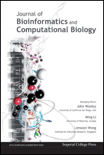
Journal of Bioinformatics and Computational Biology
Advancing the Frontiers of Bioinformatics and Computational BiologyThe Journal of Bioinformatics and Computational Biology, published by WORLD SCIENTIFIC PUBL CO PTE LTD, serves as a significant platform for disseminating innovative research in the dynamic fields of bioinformatics and computational biology. With an ISSN of 0219-7200 and an E-ISSN of 1757-6334, this journal facilitates the exchange of ideas and advancements from its inception in 2003 and continues to be pivotal through 2024. Despite its classification in the lower quartiles—Q4 in Biochemistry and Q4 in Molecular Biology, along with Q3 in Computer Science Applications—the journal remains a valuable resource for researchers and students alike, as it emphasizes interdisciplinary approaches essential for tackling complex biological problems through computational methods. Located in Singapore, the journal encourages submissions of high-quality, peer-reviewed articles that offer insights into computational techniques that empower biological research. Although this journal does not offer open access options, its contributions to research are increasingly recognized across various academic platforms. As the field evolves rapidly, this journal continues to attract a growing readership, making it an essential reference point for anyone interested in the intersection of biology and computer science.
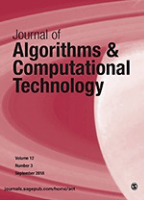
Journal of Algorithms & Computational Technology
Transforming Theoretical Insights into Practical ApplicationsJournal of Algorithms & Computational Technology, published by SAGE PUBLICATIONS LTD, serves as a noteworthy platform for scholars and practitioners in the realms of applied mathematics, computational mathematics, and numerical analysis. With an ISSN of 1748-3018 and an E-ISSN of 1748-3026, this Open Access journal has been disseminating high-quality research since 2007, ensuring that significant advancements in algorithmic techniques and computational methodologies are readily accessible to the global academic community. Based in the United Kingdom, this journal has steadily established itself within specialized quartiles, notably achieving Q3 ranking in Computational Mathematics and Q4 in both Applied Mathematics and Numerical Analysis for 2023, reflecting its growing influence in these fields. As the journal converges from 2011 to 2024, it aims to cater to the needs of researchers, professionals, and students by publishing innovative research that not only addresses theoretical frameworks but also provides practical applications. By leveraging its open-access model, the Journal of Algorithms & Computational Technology fosters a collaborative environment where knowledge can flourish, allowing for the continuous evolution of algorithms that drive technological advancement.
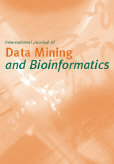
International Journal of Data Mining and Bioinformatics
Exploring Innovations at the Intersection of Data and Biology.The International Journal of Data Mining and Bioinformatics, published by InderScience Enterprises Ltd, stands as a crucial platform for researchers and professionals dedicated to the intersection of data science and biological informatics. With its ISSN 1748-5673 and E-ISSN 1748-5681, this journal captures the essence of innovative research from 2006 to 2024. Though indexed in the Q4 category for Biochemistry, Genetics and Molecular Biology and Information Systems, it maintains a respectable Q3 status in Library and Information Sciences, reflecting its growing influence within the academic community. The journal also provides insightful contributions to the fields of big data analytics, machine learning, and computational biology. Although it is not currently an open-access journal, its relevance is underscored by its Scopus rankings, indicating a solid standing in the disciplines it encompasses. Researchers, students, and practitioners in data mining and bioinformatics are encouraged to explore the findings and methodologies presented, paving the way for future innovations in this dynamic field.
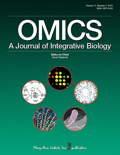
OMICS-A JOURNAL OF INTEGRATIVE BIOLOGY
Integrating knowledge to shape the future of biological sciences.OMICS-A JOURNAL OF INTEGRATIVE BIOLOGY, published by Mary Ann Liebert, Inc., is a leading peer-reviewed journal dedicated to the field of integrative biology, encompassing Biochemistry, Biotechnology, Genetics, Molecular Biology, and Medicine. With an ISSN of 1536-2310 and E-ISSN of 1557-8100, this esteemed journal stands out with its commitment to advancing scientific knowledge and research within its scope, particularly effective from its inception in 2002 through to 2024. The journal holds a commendable position in various Scopus ranks, notably achieving a Q2 quartile in Biotechnology and Medicine (miscellaneous), and continues to exemplify rigorous scholarship with an impactful focus on cross-disciplinary integration. Although not an open-access publication, OMICS ensures that its readership has access to significant findings that shape contemporary biological discourse. Researchers, professionals, and students alike are encouraged to contribute to and explore this journal, as it not only advances knowledge but also fosters collaboration among diverse scientific communities.

Molecular Systems Biology
Advancing the Frontiers of Biological ScienceMolecular Systems Biology, published by SpringerNature, is a premier open access journal that has been a cornerstone in advancing the fields of biological science since its inception in 2005. With its ISSN 1744-4292, this journal exemplifies high scholarly standards, boasting an impressive suite of impact factors, including Q1 rankings across various disciplines such as Agricultural and Biological Sciences, Biochemistry, Genetics and Molecular Biology, and more, highlighting its significant contribution to the scientific community. The journal offers robust access options to facilitate innovative research dissemination, reaching a global audience while maintaining a commitment to fostering collaboration and dialogue among researchers, professionals, and students. With a focus on integrating quantitative approaches to biological systems, Molecular Systems Biology plays a vital role in addressing complex biological questions, paving the way for groundbreaking discoveries and advancements in healthcare, environmental sustainability, and functional genomics.

JOURNAL OF MOLECULAR EVOLUTION
Exploring the Nexus of Molecular Mechanisms and EvolutionThe Journal of Molecular Evolution, published by Springer, is a prestigious peer-reviewed journal dedicated to advancing the understanding of molecular evolution through high-quality research and analysis. With an impact factor establishing it as a leading authority in the field, this journal provides a vital platform for scholars focused on the intricate relationships between molecular biology and evolutionary processes. Featuring a Q1 ranking in Ecology, Evolution, Behavior and Systematics, and significant rankings in Genetics and Molecular Biology, the journal has consistently positioned itself at the forefront of academic discourse since its inception in 1971. Notably, the journal boasts an extensive archive that converges from 1971 to 2024, providing a comprehensive resource for current and future research. Although it operates on a subscription model, the high caliber of contributions ensures that it remains an essential reference point for researchers, professionals, and advanced students eager to deepen their understanding of molecular mechanisms and evolutionary dynamics.

Cold Spring Harbor Perspectives in Biology
Illuminating the Pathways of Modern BiologyCold Spring Harbor Perspectives in Biology is a prestigious academic journal published by COLD SPRING HARBOR LAB PRESS that serves as a vital resource in the fields of Biochemistry, Genetics, and Molecular Biology. With an impressive impact factor and categorized in the Q1 quartile for its contributions, this journal is renowned for curating comprehensive reviews that synthesize the latest advancements and ongoing research in these dynamic and interconnected disciplines. Since its inception in 2009, the journal has played a pivotal role in advancing scientific knowledge through high-quality articles that cater to researchers, professionals, and students alike. Although it operates on a traditional subscription model, its contributions are indispensable for those seeking to remain at the forefront of biological research and its myriad applications. With a commendable ranking of #19 out of 221 in general biochemistry, genetics, and molecular biology on Scopus, this journal ensures that its readers have access to cutting-edge insights and a rigorous academic discourse.